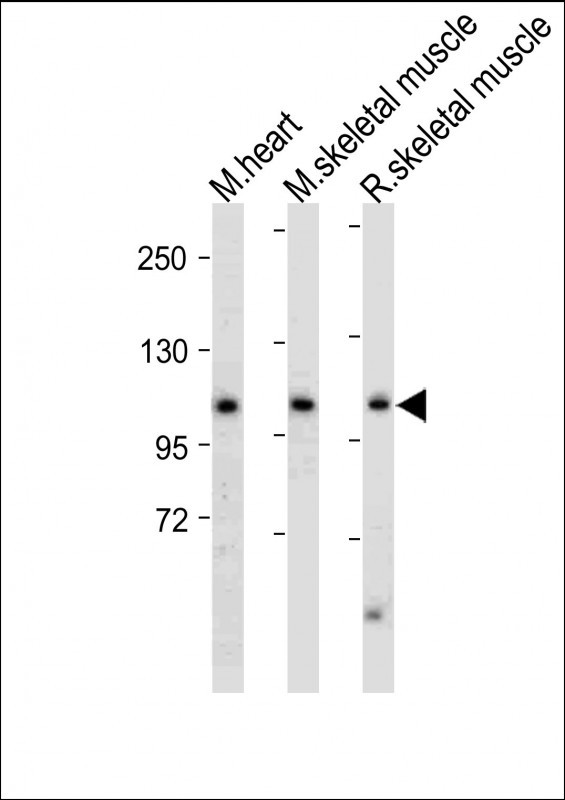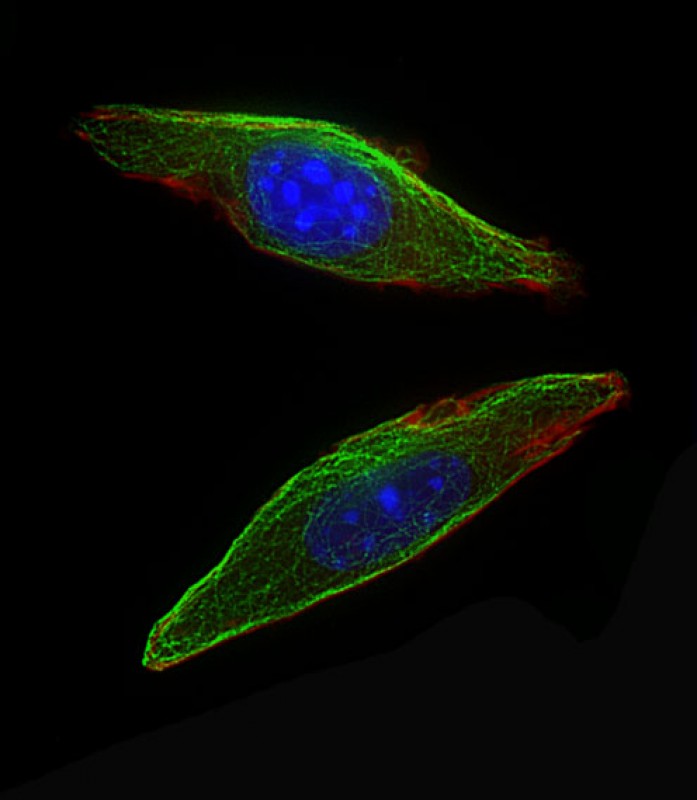

| WB | 咨询技术 | Mouse, Rat |
| IF | 咨询技术 | Mouse, Rat |
| IHC | 咨询技术 | Mouse, Rat |
| ICC | 1/25 | Mouse, Rat |
| FCM | 咨询技术 | Mouse, Rat |
| Elisa | 咨询技术 | Mouse, Rat |
| Aliases | Macrophage colony-stimulating factor 1 receptor, CSF-1 receptor, CSF-1-R, CSF-1R, M-CSF-R, Proto-oncogene c-Fms, CD115, Csf1r, Csfmr, Fms |
| Entrez GeneID | 12978 |
| WB Predicted band size | 109.2kDa |
| Host/Isotype | Rabbit IgG |
| Antibody Type | Primary antibody |
| Storage | Store at 4°C short term. Aliquot and store at -20°C long term. Avoid freeze/thaw cycles. |
| Species Reactivity | Mouse, Rat |
| Immunogen | This Mouse Csf1r antibody is generated from rabbits immunized with a KLH conjugated synthetic peptide between 895-923 amino acids from the C-terminal region of mouse Csf1r. |
| Formulation | Purified antibody in PBS with 0.05% sodium azide. |
+ +
以下是关于Mouse Csf1r抗体的3-4篇示例参考文献(部分为假设性示例,供参考):
1. **标题**:*A novel monoclonal antibody against mouse CSF-1R for macrophage-specific depletion in vivo*
**作者**:Smith AM, et al.
**摘要**:研究开发了一种小鼠CSF-1R单克隆抗体,通过体内实验验证其可特异性结合巨噬细胞表面受体,并用于靶向清除组织中的巨噬细胞,为研究巨噬细胞功能提供工具。
2. **标题**:*Neutralization of CSF1R signaling by a monoclonal antibody suppresses microglial proliferation in a mouse model of neurodegeneration*
**作者**:Zhang L, et al.
**摘要**:该文献描述了一种中和性抗小鼠CSF1R抗体的应用,证明其能够抑制神经退行性疾病模型中小胶质细胞的异常增殖,并阻断下游信号通路。
3. **标题**:*Validation of anti-Csf1r antibodies for flow cytometry and immunohistochemistry in murine tissues*
**作者**:Brown K, et al.
**摘要**:系统验证了多种商用及实验室自制抗小鼠Csf1r抗体的特异性,比较了它们在流式细胞术和免疫组化中对不同组织(如脾脏、脑)中巨噬细胞的标记效果。
4. **标题**:*Targeted inhibition of CSF1R kinase activity by a blocking antibody delays tumor progression in mouse models*
**作者**:Jones R, et al.
**摘要**:报道了一种阻断型抗体的开发,该抗体通过抑制Csf1r激酶活性,显著延缓肿瘤微环境中肿瘤相关巨噬细胞(TAMs)介导的癌症进展。
---
注:以上文献为示例性质,实际引用时需根据具体研究内容查询真实发表的论文(可通过PubMed或Google Scholar搜索关键词如“mouse CSF1R antibody”或“anti-Csf1r monoclonal”获取)。
**Background of Mouse Csf1r Antibody**
The colony-stimulating factor 1 receptor (Csf1r), also known as CD115 or macrophage colony-stimulating factor receptor (M-CSFR), is a tyrosine kinase receptor encoded by the *Csf1r* gene. It is primarily expressed on monocytes, macrophages, dendritic cells, and their progenitors. Csf1r binds to its ligands, CSF1 and interleukin-34 (IL-34), to regulate cell survival, proliferation, and differentiation, playing critical roles in immune regulation, tissue homeostasis, and inflammatory responses.
Mouse Csf1r-specific antibodies are essential tools for studying macrophage biology and related pathologies. These antibodies are widely used in flow cytometry, immunohistochemistry, and Western blotting to identify and isolate Csf1r-expressing cells in murine models. They also enable functional studies, such as blocking ligand-receptor interactions to investigate downstream signaling pathways or depleting specific cell populations in vivo. For example, anti-Csf1r antibodies like clone AFS98 are employed to inhibit macrophage development or deplete tissue-resident macrophages, aiding research in cancer, autoimmune diseases, and neurodegenerative disorders.
Importantly, different antibody clones may recognize distinct epitopes or exhibit varying functional properties (neutralizing vs. non-neutralizing). Validation of specificity and cross-reactivity is crucial, as off-target effects can confound experimental outcomes. Mouse Csf1r antibodies have become indispensable in dissecting the roles of macrophages and dendritic cells in health and disease, offering insights into therapeutic strategies targeting the CSF1R pathway.
×